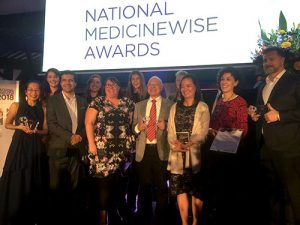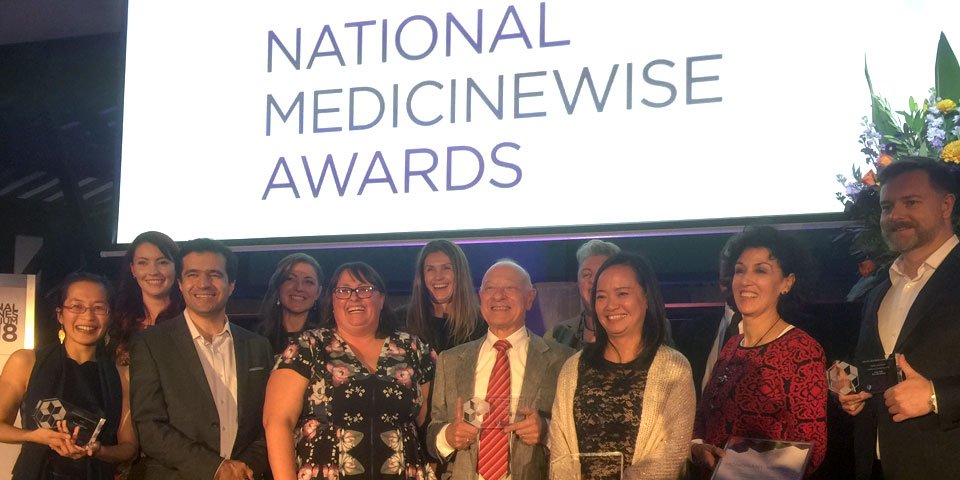 The winners of the biennial National MedicineWise Awards were announced last night as part of the 10th National Medicines Symposium in Canberra.
The winners of the biennial National MedicineWise Awards were announced last night as part of the 10th National Medicines Symposium in Canberra.
With more than 150 delegates at the gala dinner at the National Arboretum, the awards recognised best-practice innovations in improving quality use of medicines across seven categories, including initiatives for consumers, Aboriginal and Torres Strait Islanders, healthcare professionals and e-health.
The winners were:
Category: Consumer initiatives: community or population level
Winner: Larissa Hallam
Organisation: Sunshine Coast Hospital and Health Service, Mental Health and Addiction Services
Title: Stages of Medication Administration
The Stages of Medication Administration is an initiative that supports staff working in mental health units by enabling them to determine each resident’s ability to independently manage and adhere to their medication regimen and competently communicate this to their support networks, enhancing their ability to live more independently.
Category: Aboriginal and Torres Strait Islander initiatives
Winner: Steve Cohen
Organisation: Our Pills Talk Ltd
Title: Our Pills Talk Medication Safety App
The Our Pills Talk Medication Safety App assists with reducing adverse drug events among Indigenous communities. The app talks patients through the process of taking their medicines to ensure safety and accuracy in medicines consumption. The app helps to save lives, reduces emergency department admissions and provides accuracy for emergency departments and locum GPs, with the patient’s medication history safely stored in the cloud.
Category: Health professional programs: <$100,000 budget and >$100,000 budget
Winner < $100,000 budget: Dr Geoff Broomhall and team
Organisation: Eastern Melbourne Primary Health Network and North-Western Melbourne Primary Health Network
Title: Health Pathways
This project showcases a collaborative approach to the general health of the population, encouraging delivery by primary care. It demonstrates a comprehensive source of data and advice for GPs. A Melbourne focus with national appeal.
Winner > $100,000 budget: Tobias Speare
Organisation: Centre for Remote Health
Title: Pharmacotherapeutics for Remote Area Nurses
This project developed a short online course in safe medicines management, promoting quality use of medicines and patient care for the remote nursing workforce. Results show the course helps improve self-reported knowledge, confidence, awareness and competence, particularly in relation to patient-centred care and clinical reasoning associated with management of medications and the use of appropriate resources to support practice.
Category: Excellence in consumer information
Winner: Nicole McDerby
Organisation: University of Canberra
Title: Can inclusion of clinical pharmacist services in residential aged care homes improve quality use of medicines for residents?
This entry was an Australian first, piloting a residential care pharmacist model within the aged care setting. The research highlighted many promising areas for improving quality use of medicines, including improved safety in medication administration in a population at high risk of medication misadventure.
Category: Excellence in e-health resources
Winner: Gustavo de Carvahelo Machado
Organisation: Sydney School of Public Health, University of Sydney
Title: STARS Back Pain App – using real-time emergency departments data to improve patient outcomes
This award winner developed an app as a data analytics and benchmarking tool to capture and improve the evidence-based management of patients presenting to emergency departments with low back pain. The app enables clinicians to access real-time data, identify unwarranted clinical variation, evaluate healthcare practices and optimise patient outcomes.
Category: Excellence in media reporting
Winner: Jason Gale
Organisation: Bloomberg News
Title: How Antibiotic-Tainted Seafood from China Ends Up on Your Table
Mr Gale’s story gave insights into the emergence and spread of antimicrobial resistance and why it is one of the biggest threats to global health. He developed an investigative story focusing on the use of antibiotics in food-animal production in China and India, and how the abuse of antibiotics has spread to aquaculture, the fastest-growing segment of the world food economy. Mr Gale revealed how illegal and lax practices have enabled antibiotic-laden shrimp from China to be laundered through Malaysia and sent to thousands of suppliers in the US.







